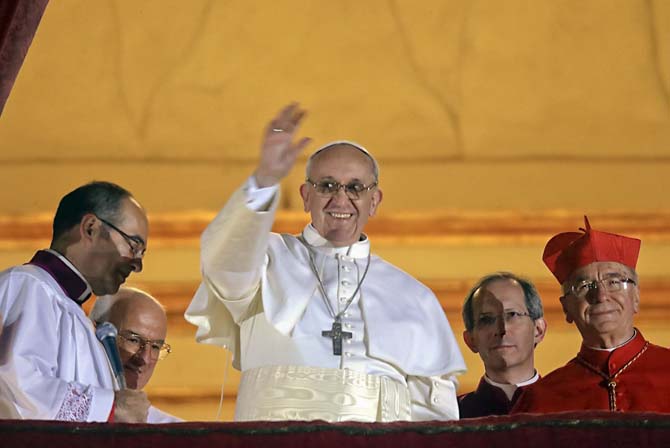White smoke ascended from the Sistine Chapel’s chimney in Vatican City on Wednesday as the College of Cardinals chose a new leader of the Catholic Church. While cheers echoed throughout Vatican City, they also rose from campus.
Jorge Bergoglio of Argentina, the first non-European pope in more than 1,000 years and the first Latin American pope in the church’s history, was announced as Pope Benedict XVI’s successor. Bergoglio chose the name Francis, another first in the church’s history.
Father Bob Stine of Christ the King Church and Catholic Student Center said he was hoping for a non-European pope to show that the Catholic Church has a worldwide presence.
“A large part of the 1.2 billion Catholics live outside of Europe,” Stine said. “To kind of acknowledge that is really, really good.”
Stine said the church’s recognition as a worldwide institution has grown since the 20th century and it’s important to represent that change in the church’s leadership.
Biological engineering junior Matthew Zelinsky said the pope’s Latin American background is a good thing because most Catholics outside of Europe reside there.
The church’s increasingly global reputation is “a gradual development,” Stine said. He said modern communication and technology have aided this expansion.
Zelinsky said he likes that the church seems to be more open to modern technology, referencing the pope’s Twitter account.
“This is the first mode of communication where lay-Catholics can directly interact with the pope rather than going through priests or the bishop,” Zelinsky said. “Obviously, he’s not just scrolling through his timeline, but he definitely sees it.”
Stine said he doesn’t expect Pope Francis to change much in terms of the church’s basic policies, but added that each pope puts his own stamp on the job.
“Whichever cardinal gets elected pope, they all share a common set of values, a common set of understandings,” Stine said.
Stine stressed the significance of Bergoglio choosing the name Francis, a reference to St. Francis of Assisi.
St. Francis of Assisi, the patron saint of animals, merchants and ecology, was a spiritual reformer with a humble lifestyle, Stine said, and the new pope’s name choice reflects his dedication to this ideal.
International trade and finance senior and outreach minister at Christ the King Ben Domingue agreed that the selection of a non-European pope is a good thing.
“It’s not just a bunch of old white men who sit up in the church in Rome,” Domingue said.
Domingue said he is pleased Francis will be the church’s first Jesuit pope because they are considered the “thinkers” of the Catholic faith.
“A lot of people think science and reason are real and that Catholicism and religion are fairytales,” Domingue said. “Faith and reason line up with the Jesuits.”
Katie Richard, mass communication junior, called the selection of a pope with a non-European background necessary, saying Francis’ Latin American background could help to revitalize and rekindle the “fire of faith” because Latin American Catholics’ faith tends to be so powerful.
“St. Francis is so humble and so loving, and that was referenced in the first five minutes of the first words the pope spoke,” Richard said. “I think it was just perfect.”
– First non-European pope in more than 1,000 years
– Has lived with one functioning lung for more than 50 years
– First Jesuit pope
– Chose to live in a small apartment rather than the formal bishop’s residence
– Taught literature, philosophy, theology and psychology before becoming Archbishop of Argentina





